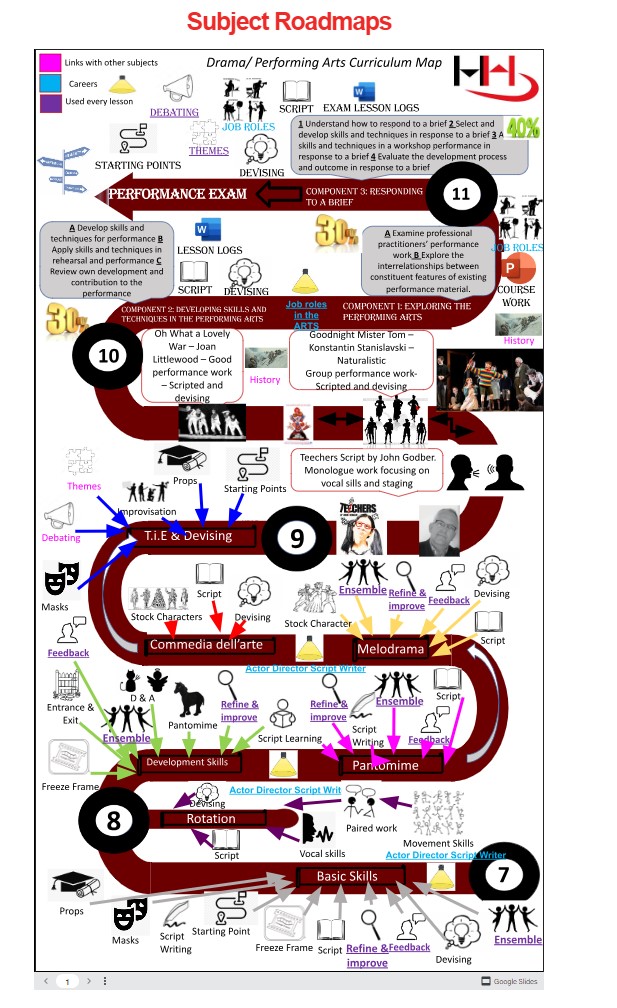Performing Arts
Job Options
Jobs directly related to performing arts include:
- Actor
- Community arts worker
- Choreographer
- Dancer
- Dramatherapist
- Music producer
- Music therapist
- Theatre director
Drama and Performing Arts
Drama and Performing Arts aims to challenge and stretch the students as performers as well as individuals. Drama is a powerful tool that helps students understand their place in the human world and the emotions of themselves and others, thus nurturing self-confidence, spiritual, moral and cultural awareness and creativity. This subject introduces pupils to a range of practitioners enriching their language skills and at times links with History and Social Studies. It builds their memory’s capacity when they learn a script. This self-discipline is reinforced by the dependence on a performer by the whole cast.
Students are also able to audition for the annual School Production, where the expectation is that all cast members develop performance talent and professionalism, even if they are not pursuing this subject for an exam.
On occasion suitable performances are taken to our feeder schools within the federation to enrich their curriculum and heighten their awareness of this subject.
IMPLEMENTATION OF EDUCATION IN PERFORMING ARTS
KS3
An enjoyable, challenging and varied curriculum is compulsory at KS3.
At KS3 we aim to introduce students to a range of topics and issues that stimulate and educate. Students explore Pantomime, Melodrama, Commeida Dell’arte and Theatre in Education. Within each scheme of work students are introduced to a full range of drama techniques such as Physical Theatre and Mime. The explorative strategies which students develop through their two years of KS3 are the foundations on which BTEC is built.
Formative assessment of students are made in four areas: performance, making, group work and responding. Every lesson students are given WWW and EBI as a group or individuals.
KS4
At KS4 students who have chosen BTEC Performing Arts start by building the foundations for their course. They explore varied Drama practitioners to develop their range of knowledge and understanding which is key to their extremal practical exam which takes place in year 11. They develop their understanding of performance skills by studying and performing a selection of scripted performance plays and musicals. BTEC Performing Arts has three components which are delivered in year 10 and year 11.
Component One – Exploring the Performing Arts 30%
Component Two – Delivering Skills and Techniques in the Performing Arts 30%
Component Three – Performing to a Brief – External exam 40%
BTEC guidelines for marking state that only summative assessments should be made and these are assessed by the BTEC SVs when called for sample.
CURRICULUM OVERVIEW YEAR BY YEAR
Year Seven
In year seven we teach basic Drama skills as listed on the curriculum overview, and ensure the disciplines of this rigorous subject are understood so learners can engage fully and participate to the best of their ability. Drama is part of a rotation system which was introduced in September 2018.
A weekly Drama Club is open for all year sevens on a Tuesday at lunch time and helps make up the teaching time lost with the new rotation.
Year Eight
In year eight we continue to teach a wide range of drama skills but the links to English, History and Social Studies are explicit.
Year Nine
In year nine we work closely on three scripts focusing on their different styles, genres and practitioners.
Years Ten and Eleven
We follow the BTEC Syllabus but pick scripts relevant to our cohorts’ needs and abilities. In year ten, the students can invite an audience to see their performance.
IMPACT
Continuous assessment is inherent in every drama lesson as is peer and self-assessment. These are used by teachers to determine a child’s level six times a year although data is only entered three times a year. This allows for intervention in lessons to ensure good progress is made in all year groups.
Assessment of students in Ks3 are made in four areas: performance, making, group work and responding. Every lesson students are given WWW and EBI as a group or individuals.
BTEC guidelines for marking state that only summative assessments should be made and these are assessed by the BTEC SVs when called for sample.
